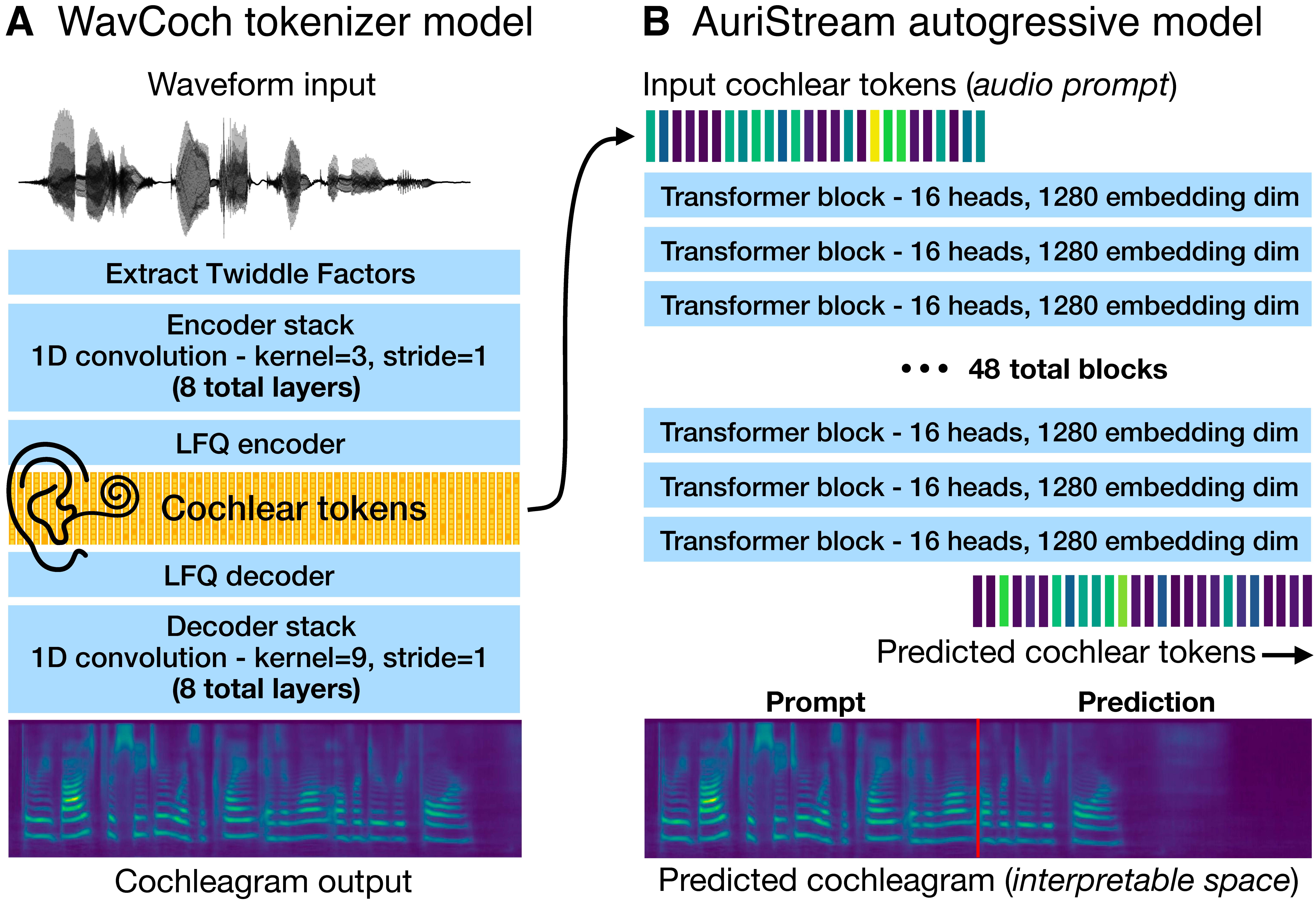AuriStream-1B
AuriStream is a biologically-inspired, GPT-style autoregressive Transformer trained to predict tokens from the speech stream (denoted as cochlear tokens). These cochlear tokens are discrete codes produced by a companion “WavCoch” tokenizer (a model trained to predict the time-frequency cochleagram from a waveform, with a LFQ bottleneck for token read-out). AuriStream utilizes a long context window of (20 s, ~4096 tokens) and is trained on **LibriLight (60k hours)** for 500k steps. It learns meaningful representations about e.g. phoneme/word identity and can predict future tokens to generate speech continuations. Inputs are cochlear token IDs; use it with a WavCoch tokenizer for audio -> tokens.
Installation
pip install -U torch torchaudio transformers
This model uses custom code; when loading from Hugging Face, pass trust_remote_code=True.
Use case 1) Get hidden state embeddings for an audio waveform
import torch, torchaudio
from transformers import AutoModel
device = "cuda" if torch.cuda.is_available() else "cpu"
# 1) Load the WavCoch tokenizer (audio -> token IDs)
quantizer = AutoModel.from_pretrained(
"TuKoResearch/WavCochV8192", trust_remote_code=True
).to(device).eval()
# 2) Load the AuriStream LM (tokens -> hidden states / next-token prediction)
lm = AutoModel.from_pretrained(
"TuKoResearch/AuriStream1B_librilight_ckpt500k", trust_remote_code=True
).to(device).eval()
# 3) Read an audio file (mono, 16 kHz recommended)
wav, sr = torchaudio.load("sample.wav")
if wav.size(0) > 1: # stereo -> mono
wav = wav.mean(dim=0, keepdim=True)
if sr != 16_000:
wav = torchaudio.transforms.Resample(sr, 16_000)(wav)
sr = 16_000
# 4) Quantize the audio to obtain cochlear token IDs
with torch.no_grad():
# The quantizer forward method expects (B, 1, T); returns (B, L)
token_ids = quantizer(wav.unsqueeze(0).to(device))['input_ids'] # (1, L)
# 5) Forward pass to obtain hidden states
with torch.no_grad():
out = lm(token_ids, output_hidden_states=True)
last_layer = out["hidden_states"][-1] # (1, T, D)
last_layer_mean = last_layer.mean(dim=1) # time mean-pool -> (1, D)
print("Mean-pooled embedding shape:", last_layer_mean.shape)
Notes
output_hidden_states=Truereturns all layers.- For phoneme/word segments, slice the time axis before pooling.
Use case 2) Generate a speech continuation (cochlear token prediction)
import torch, torchaudio
from transformers import AutoModel
device = "cuda" if torch.cuda.is_available() else "cpu"
# WavCoch tokenizer (audio -> tokens)
quantizer = AutoModel.from_pretrained(
"TuKoResearch/WavCochV8192", trust_remote_code=True
).to(device).eval()
# AuriStream LM (tokens -> next tokens)
lm = AutoModel.from_pretrained(
"TuKoResearch/AuriStream1B_librilight_ckpt500k", trust_remote_code=True
).to(device).eval()
# Load and prep a short prompt (e.g., 3s of audio at 16 kHz)
prompt_seconds = 3
wav, sr = torchaudio.load("prompt.wav")
if wav.size(0) > 1:
wav = wav.mean(dim=0, keepdim=True)
if sr != 16_000:
wav = torchaudio.transforms.Resample(sr, 16_000)(wav)
sr = 16_000
# Slice using an integer number of samples
n_samples = int(round(sr * prompt_seconds))
wav = wav[:, :n_samples]
# Quantize the prompt audio to get token IDs
with torch.no_grad():
prompt_tokens = quantizer(wav.unsqueeze(0).to(device))['input_ids'] # (1, L)
# Decide how many future tokens to generate ("roll-out")
tokens_per_sec = prompt_tokens.size(1) / float(prompt_seconds)
rollout_seconds = 2
rollout_steps = int(round(tokens_per_sec * rollout_seconds)) # K
# Generate future tokens
with torch.no_grad():
# returns (pred_tokens, pred_logits); temperature/top_k/top_p/seed optional
pred_tokens, _ = lm.generate(
prompt_tokens, rollout_steps, temp=0.7, top_k=50, top_p=0.95, seed=0
)
full_tokens = torch.cat([prompt_tokens, pred_tokens], dim=1) # (1, L+K)
Architecture overview

Schematic of the WavCoch tokenizer (panel A) and the AuriStream model (panel B).
Citation
If you use this model, please cite:
@inproceedings{tuckute2025cochleartokens,
title = {Representing Speech Through Autoregressive Prediction of Cochlear Tokens},
author = {Greta Tuckute and Klemen Kotar and Evelina Fedorenko and Daniel Yamins},
booktitle = {Interspeech 2025},
year = {2025},
pages = {2180--2184},
doi = {10.21437/Interspeech.2025-2044},
issn = {2958-1796}
}
- Downloads last month
- 168